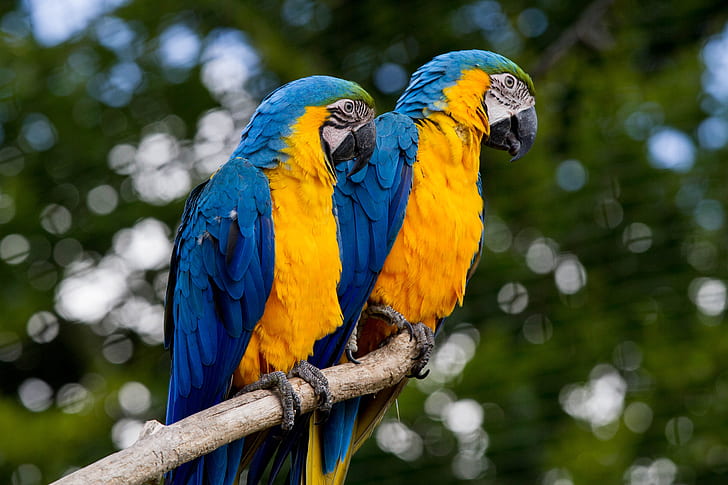Translated from the Malayalam by K. M. Ajir Kutty

Image used for representation.
The zoo was in the middle of the city. There were no animals that were not sheltered in that vast expanse of zoo covering two hundred acres. So were the trees.
A macaque hid himself at daybreak behind leaves on a branch of the Simsipa tree and sat thinking about why, once inside the zoo, it is not felt that the place dotted with innumerable trees is well within the bounds of the city. Sitting there on the branch of the tree, he said, looking at the morning walkers who appear on the scene even before the day breaks:
“These guys have no sleep at night, methinks.”
But it was the night watchman, Rama Swami, who gave voice to the soliloquy of the macaque while opening the gate for the morning walkers to enter.
They would hang around in droves even before the gate is opened—the walkers, the ones who are very particular about doing physical exercises. The whole crowd comprises people with irregular heartbeats, malfunctioning kidneys, hypertension, cholesterol, breathing difficulties, and diabetes.
It is something of a sight to watch each one of them walk in a style peculiar to him. Some people walk moving their hands forward and backward in left-right fashion as if taking commands from a military officer. There are those who stagger with their hands freely hanging down. Some would stomp ahead shaking their bodies and stomachs. Some others walk with their chests protruding and briskly waving their gloved hands as though they had tiny, invisible pieces of wood right under their chins reminding one of a bird in the zoo. The style of walking adopted by some people would be as though they are lunging forward to hit someone around, but they would simply pass at the same tempo as they had come without doing any harm. There are those who walk shaking their breasts and backs briskly, perspiring all over and as though they are throwing a challenge to life. And there are also people who walk as though their hands are in the corpse pose of the yoga with their chests drawing down and their heads protruding at once…
Each style of walk originates from its own genus…
“Now look at that guy, lying all stretched out on his back on that lawn.”
When the macaque uttered those words, the she-macaque said:
“He may have fallen to this state after having taken hooch.”
“After all, humans are like this. Is he the only one to lie down being drunk when so many others are making their rounds?”
“Oh, he doesn’t even stir.”
“That is right. He is not stirring. And his body is icy.”
“He’s not breathing either.”
“Oh, he may be dead.”
“Yes, dead.”
Look, it is those who are not dead yet who walk on toward their goals. Some people among them are like pigs shot at.
Not even a single one of them, still busy walking, bother to take a look at him. Does anyone enquire who he is…? Okay, let it go. Not even a single man looks in that direction.
Those who have lost their eyes to see somebody who has fallen before them can go on trudging along, sweating all over. Concern for one’s own health makes one suck sand.
The scene we had seen sitting hidden behind the foliage of the Simsipa tree in Lanka is what stands by us even now. At a faraway place in a house, Sita with her hair and clothes dust laden recites the name of Rama, rolling over the dusty floor…
He is Sriraman, a househusband. Was it in the evening or at dawn that he set out from home? He had been called many times from the same number in the morning. His wife had been admitted to the hospital the day before. It was with the doctor’s slips asking him to produce reports of different tests to be done on his wife that he left the hospital. He wanted to find the money for them. That unlucky man, who was being intimidated by a house taken on rent and the usurious money lenders, may have found a moment’s solace on that lawn.”
The macaque protested at the words of the she-monkey:
“What nonsense you are talking! Do husbands go out begging for money to meet the medical expenses of their wives admitted to the hospital for treatment? Will they come to the zoo to unload their miseries onto its lawns? The middle class today has fallen prey to some sort of schemes to cover medical expenses, haven’t they? Star or MediCare or something… If it had not been like that, how would have the medical expenses gone shooting up like rockets.”
“He may be one without any such policy or so. He might not have been able to make even a paisa. He was neither able to borrow nor was he smart enough to return the money borrowed, if at all he borrowed. It may be on that lawn that he may have landed jumping over the chasm of nothingness.”
“Will it be that so?”
“It can be. Or it cannot be either.”
“Or else his beloved daughter may have eloped with some man.”
“Why should she elope? If she admits to having fallen in love with somebody, her parents themselves would marry her off. The new generation boys and girls never secretly run away with their lovers; they simply go away from home and live together elsewhere.”
“There are also those who will not do that. Just think of those who are overly pampered and are brought up in the fond hope of leaning on them in later years…”
“Do you know of the tree we are sitting on? This is the tree planted and reared in the Ramayana for something to be stashed away either at the foot or at the top.”
There was only this tree in the whole of Lanka to assist someone to find the one who was at large after stealing somebody. The truth of this tree is the truth of inquiry as well.
“Look, isn’t that a writer who is walking past us? The muscles of his legs have not sagged even though he is past seventy.”
“Do you remember the poet who used to walk with his curved legs along C. V. Raman Pillai Road with the ends of his mundu (dhoti) folded up and tied around the waist?”
“Yes, yes.”
“And the novelist whose one foot would find it hard to reach the pedal despite completing one round of pedaling?”
“No, no.”
“Look at the sights that await one as the day breaks! On each road, there was at least one health-conscious saint put on view at 6 o’clock in the morning.”
“Now, is it okay for us to sit simply watching the scenes? Shall we go and enquire after the man lying on the lawn?”
“Let us check the identity card lying in his pocket. Poring over his Aadhar card would be better than that. All foundations of a man have been made visible in that.”
“We are monkeys. Those things are none of our business. Moreover, we are not allowed to go beyond this tree. That which is decreed for men is theirs and that which is ordained for animals is ours. Ignoring this, if we are to pilfer from each other, Maneka ji will sniff it out. She is the one who fired the superintendent for our sake. Such an awe-inspiring figure. No, daughter, no. Maneka ji is not Sonia ji.”
By then a wind blew. Spreading the fragrance of Elanji flowers, enlivened the morning ambiance. The morning walkers were energized further.
“O wind, wind,” the macaque called.
“You go and see what is there in the pocket of the one lying there. But first of all, you breathe your life into his nostrils. We pray that he awakens at that. Anyway, you go and tell us after examining him.”
In a subsequent search carried out by the wind, the following things were found: receipts for ornaments pawned which are now irredeemable, a letter written by him to someone other than his wife detailing the hardships faced by him in life, copies of horoscopes, doctor’s prescription, a soiled and torn currency note of ten rupee denomination, addresses of two persons living in the city, a few phone numbers.
But it was a multi-colored fan made of paper that the wind brought. When folded, the fan made of thin, colored paper will be the size of the little finger. The scent of attar emanated from it. Did he use to fan himself to sleep with this? Did he doze off, with the fan in his pocket, after having been carried away by the wafts of fragrance emanating from it? When his life, having departed from him in full moonlight, stood near the portals of paradise, it was by the sides of the beds of sunflowers and speedwell flowers that he lay.
“The unemployed in our country are umpteen today.”
“Who is there who is not engaging in some kind of hoodwinking to make money? With schemes such as the employment guarantee scheme, freebies to the below-poverty-line ration card holders, doles, and different kinds of pension schemes, who is there who is not able to cough up some money to buy at least a measure of rice? But the truth is that the number of those whose self-respect is ant-eaten and has thus become burning coal is more than what you think it is. There are also scapegoats that are destined to move precariously along a trapeze in the city itself. Just tear it apart. You will see a ripe bulb of onion standing ready to come off at the touch of a finger. Or else you have a ripe jackfruit coming off its stalk.”
“But people like them won’t be among this crowd, anyway,” the macaque said, viewing the multitude of people walking.
“They may be there, too. They may also be walking among them without letting themselves be noticed by the others; if you take a closer look, you will see.”
“Why should we look at them intently? We aren’t humans, are we?”
“But it’s not in the affairs of humans that people are interested in. Rather, they are interested in us… their campaigns for saving animals and birds from extinction have starved us, really.”
“When some from among us jumped the enclosure, it was the animal keeper who was fired from job. So also, when that camel was down with foot and mouth disease, it was the supervisor who lost his job. Their playing with animals has gone beyond the limits and it was now with the larynx of the rhinoceros that they were playing their games. So what, the keeper’s hand was bitten off by the rhino. Animals are animals. Let no human being come forward to help us animals.”
“It was more than one week since the rhino was given its share of the feed. The animal keeper was enjoying a feast of fried and stir-fried beef meant for some animals. The keeper’s hand fattened on beef was bitten off by that animal; the rhino.”
“Are you blowing up the incident? No need for it. The name of the animal itself will do—rhinoceros.”
“Aren’t the humans also called by our names? Aren’t there donkeys, tigers, lions, and giraffes among human beings too? You will even find vultures and eagles among them, too. You may round off the list by including the pangolin as well.”
“But it is all about their names and the nature associated with them. The games they play are meant to belittle us. Will this zoo in the middle of the city stand in for the city of Thiruvananthapuram? Or there’s no way it can be outside, far away from it? This is what we say.”
“Let’s stop this discussion.”
Nobody even bothers to look at that man. The sunflower hangs its face down over his half-blossomed visage. The speedwell flowers too, with their faces lowered, say something to him. Or is it the brightly-hued paper fan that is whispering something to the flowers? Or is it speaking to the man lying in the resplendence of the butterflies? Or is it imagining something? The housewife is eagerly expecting the arrival of the househusband at the doorstep of memories in the hospital. Although exhausted and fallen, at the end of his weary searches, he would come back with a half-blossomed smile on his lips, as always. He cannot but arrive, she imagines.
The creditors are attaching the house. They are throwing out the furniture and other belongings. Holding his pregnant wife by her hand, he is taking to the street.
If it were a scene in a movie…!
When he was thrown out of the organization he helped to build up with his life, it was onto this lawn that he had to deposit himself after swirling wildly all alone in the singeing depths of treachery. The rustles of flower petals may have invited him, preventing him from finding another prop to lean on.
Nobody is seeing him, for sure. Nobody really wants to see him. Everyone is content with seeing themselves. When every action, every operation turns out to be something meant to serve self-interests, the other is just a worm, a maggot.
The sun is beginning to rise. The morning walkers hurriedly retrace their steps to exit from the zoo walkways to get back home in cars and on scooters by which they had come for the walk at daybreak.
The workers of the zoo have started arriving. Buses bringing tourists have also started to arrive. The visitors who have come to see the zoo are here. Now, we can no longer sit here on the Simsipa tree watching sights. Men to take a count of us will come. And the elder brothers will come to feed us, too. We do not intend to make someone jump over walls looking for us and in case we are not spotted here, prepare the ground for him to be dismissed from the job. But, will it be alright if he continues to lie on the lawn like that?
“Why can’t we take him for company? He whom the humans don’t care even to take a look at!”
“But his body which is already dead is without life.”
“Doesn’t have life? Then what is the sun for?”
“Hei, Sun! We are the descendants of the monkeys of the Simsipa tree. We, the grandchildren of the granddad who found the stolen wife of the son of God born in your clan supplicate that the dead body lying there be brought back to life and presented before us.”
The sun gathered the gentleman in its rays and walked him to the zoo.
Great!
Go, get going!
The gentleman walked, ceremoniously. But he staggered, doddered, and fell onto the lawn of the zoo, with his neck collapsing.
This is what is called the living dead!
The sun had not given him life. It was sheer eyewash!
How can it give life? That is the prerogative of Lord Brahma, after all.
No matter what happens, walking in the front and back of him, we are taking him to our cage, negotiating a crisscross of shortcuts.
From now on, he will stay with us as an animal.
An animal?
Yes. Why doubt? Those who are shunned by human beings are animals. The animals want humans.
He is no longer a human being.
The humans do not want him.
He was a human, too, once.
He had a tough time trying to stand shoulder to shoulder with his equals, but he faltered and came near us. And he reposed himself so conveniently as to give us a full view of him, didn’t he?
So, what…?
He will be with us…
Yes. There is an empty cage.
An empty cage?
Yes. The rhino has jumped its cage, hasn’t it? The rhino has disappeared into the multitude of the city. He has sniffed all those morning walkers who walked around the museum within the compounds of the zoo this morning.
How can we convert the cage of a rhino to that of a man?
There is no rhino in the zoo. That is just a name given by man.
Thus in the right middle of the zoo, in an empty cage, one more guest was sheltered. An animal capable of having dreams.
The sunflowers just then stood arrayed around him and smiled. The speedwell creepers grew long new shoots and weaved themselves into an arbor rich with its flowers. Diffusing its rays, the sun added to the splendor of its beauty.
Right at the center of the zoo, he is lying on the lawn now. The same pose as he had in the beginning. Permeating the fragrance of Elanji flowers, a breeze came and kissed him on the forehead. The fan made of colored paper just then rose as a rainbow over his head.
Also, read a book review of Uday Prakash’s The Walls Of Delhi written by Anandi Kar, and published in The Antonym:
Follow The Antonym’s Facebook page and Instagram account for more content and exciting updates.



























0 Comments